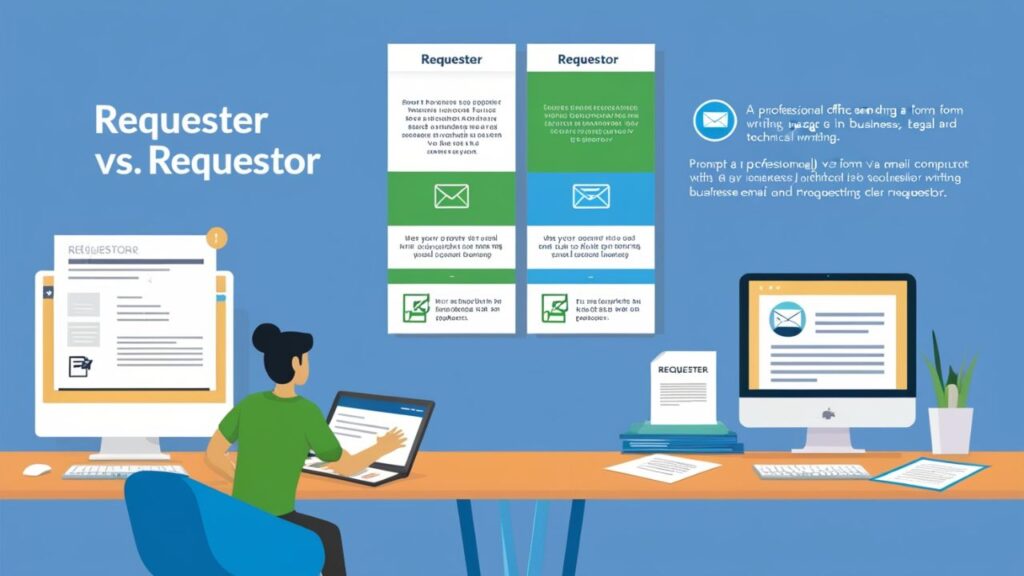Requester and requestor both mean someone who asks for something. Requester is more common in everyday writing, emails, and business reports. It sounds natural and simple, so most people understand it quickly.
In legal papers and technical documents, requestor is often used. This spelling fits formal rules and professional settings. Writers follow this choice to keep documents clear, correct, and aligned with industry standards.
Choosing the right form is easy. Use requester in normal writing and requestor in legal or tech writing. Being consistent makes your work look professional and avoids confusing readers or colleagues.
What Do “requester” and “requestor” Mean?
Requester and requestor both name a person who asks for something. Requester is common in emails, reports, and everyday writing, while requestor appears in legal papers and technical documents. Both help make writing clear and correct.
These words come from the verb request. Adding -er or -or turns it into a noun that shows who performs the action. Choosing the right form keeps writing professional, easy to read, and suitable for the situation.
requester vs requestor: Spelling Difference

The main difference between requester and requestor is the ending. Requester uses -er, which is common in English for words naming someone who does an action. Requestor uses -or and sounds more formal or legal.
Both words come from the verb request. Requester is widely used in emails, reports, and business writing. Requestor appears in technical documents or legal papers. Choosing the right spelling keeps writing professional, clear, and easy for readers to understand.
See Also : Excel vs Accel: Meaning, Usage, and Examples
Origins and Etymology
The words requester and requestor come from the verb request, which has Latin roots. Adding -er or -or turns it into a noun that names the person making the request.
English prefers -er for most agent words, while -or appears in formal or Latin-influenced words like actor or editor. This explains why both spellings exist and why each fits different types of writing.
Examples in Context
In business writing, requester works well. For example, “The requester sent the report before the deadline.” This spelling feels natural in emails, reports, and everyday office documents.
In legal and technical writing, requestor fits better. For example, “The requestor must provide valid credentials.” Using the right word keeps documents clear, professional, and correct.
Scenario: Business Email
- “The requester submitted the report before the deadline.” In this context, requester feels natural and works well in emails, memos, and other business communications
Scenario: Technical Documentation
- “The requestor must include a valid API key in the system call.” Here, requestor is correct because it matches coding and technical writing standards.
Scenario: Legal Document
- “The requestor shall be responsible for any errors or misstatements.” In legal writing, requestor fits formal language and typical contract terminology.
Industry Norms Table

| Context | Preferred Spelling | Notes |
|---|---|---|
| Business emails, reports | Requester | Common in workplace communication |
| Legal documents | Requestor | Seen in contracts and formal legal text |
| Technical writing, APIs | Requestor | Used in coding, specs, and documentation |
| Academic writing | Requester | Preferred in formal but general writing |
The industry norms table shows where requester and requestor are used. Requester is common in business emails, reports, and academic writing, making documents clear and professional for everyday communication.
Requestor appears in legal papers and technical writing. Following the table helps writers choose the correct spelling, maintain consistency, and ensure their work meets professional standards in each industry.
Tips to Overcome Confusion
Tips to Overcome Confusion
- Use requester in everyday writing; it is simple and familiar.
- Choose requestor only for legal or technical documents.
- Stay consistent to make your writing clear and easy to read.
- Check past documents to follow your team’s preferred spelling.
- Following these tips keeps work professional and avoids mistakes.
Synonyms You Can Use
You can use other words instead of requester or requestor to avoid repeating them. Words like applicant, submitter, and inquirer work well in emails, reports, and general writing.
Some synonyms fit specific situations better. Petitioner suits legal writing, while claimant works for formal documents. Choosing the right synonym keeps writing clear, professional, and easy for readers to understand.
If you’re repeating “requester” or “requestor” too often, try one of these:
- Applicant
- Petitioner
- Inquirer
- Submitter
- Claimant
See Also : Pre vs Post: Master Prefix Usage for Clear Writing
FAQs
What is the difference between requestor and requester?
Requester is common in business and general writing. Requestor appears in legal or technical contexts. Both mean a person making a request.
Who are requestor and requestee?
A requestor makes a request, while a requestee receives it. Both terms define roles in transactions, contracts, or formal communication.
Is it requester or requestor in British English?
In British English, requester is more common in general writing. Requestor appears mainly in legal or technical documents.
What is the definition of a requestor?
A requestor is a person who formally asks for something, often used in legal, technical, or formal documentation.
What is the difference between requester and preparer?
A requester asks for something, while a preparer creates or completes documents, forms, or reports. Their roles are different in tasks.
What is another word for requestor?
Other words for requestor include applicant, petitioner, inquirer, submitter, and claimant, depending on context.
What is the meaning of requester?
A requester is a person who asks for something, commonly used in business, academic, or everyday writing.
What is the opposite of requester?
The opposite of a requester is a requestee, the person who receives or fulfills the request.
What is requestor identity?
Requestor identity refers to the verified details of the person making a request in legal, technical, or system processes.
What is a synonym for requester?
Synonyms for requester include applicant, inquirer, submitter, claimant, and petitioner, chosen based on context and writing style.
What is the opposite of requester?
The opposite of a requester is the requestee, who receives, approves, or acts upon the request in any formal process.
Conclusion
The words requester and requestor mean the same thing, but their usage changes with context. Requester is best for everyday writing, emails, and business reports, while requestor fits legal documents and technical writing.
Choosing the right form improves clarity and professionalism. Staying consistent with requester or requestor helps readers understand your message easily. Clear, correct usage makes your writing look polished, reliable, and suitable for any workplace or formal setting.

Join Bibcia on a journey to master English grammar. Discover easy lessons, writing tips, and practical examples designed to make learning grammar simple and effective.










